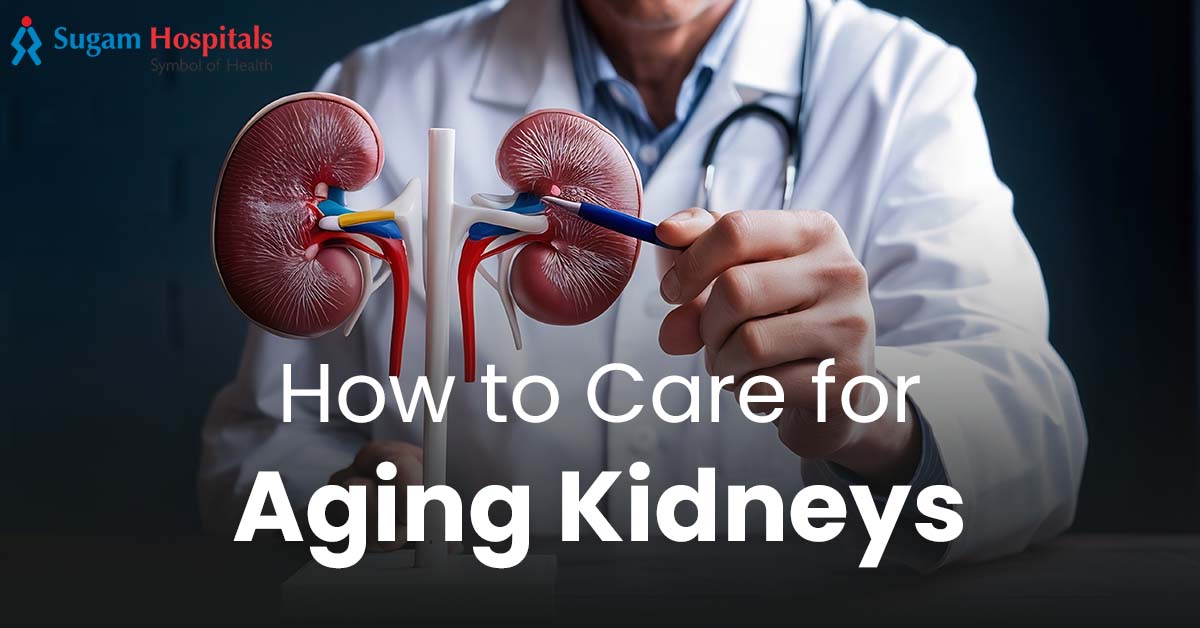How to Care for Aging Kidneys

How to Care for Aging Kidneys
August 6, 2025 by adminLike many other organs, our kidneys can slow down as we get older. These important filters work hard to eliminate waste, maintain electrolyte balance and regulate blood pressure. But older age can slowly degrade kidney function, typically without recognizable symptoms.
Taking steps in your 40s, 50s and beyond can positively affect your kidney health. If you are taking care of yourself or an aging parent, knowing what you can do to protect kidney function is critical to long-term wellbeing.
1. Stay Well-Hydrated
Water helps the kidneys eliminate waste, which is important for hydration. Too much water can be taxing on compromised kidneys, particularly for the elderly. Rather than prescribe the “8 glasses a day” guideline, look to lighter urine as best practice and consult with your doctor so they can provide you with useful guidelines based on your history.
2. Monitor Blood Pressure and Blood Sugar Regularly
High blood pressure and diabetes are the most prevalent causes of kidney injury in the older population. Regular testing and good management of these diseases is fundamental to slow or prevent kidney decline. Management can include lifestyle changes, medications or other based on someone’s individual risk factors.
3. Reduce Salt and Processed Foods
Too much sodium can raise blood pressure and can put an additional workload on your kidneys. Even processed foods like chips, packaged snacks and instant meals can be loaded with salt. You might consider trying to cook fresh meals with fresh ingredients using herbs, lemon, and spices, instead.
4. Be Mindful of Over-the-Counter Medications
Pain relievers like ibuprofen and naproxen (NSAIDs) can be detrimental to aging kidneys if you take it often, or on a regular basis!
Always check with your doctor when taking non-prescription, or even over-the-counter medications, especially if you already take medication for blood pressure and diabetes.
5. Maintain a Healthy Weight and Stay Active
Obesity correlates strongly with kidney disease. You do not need to run a marathon; a few gentle activities like walking, yoga, or light strength training can improve circulation, while simultaneously lowering pressure on kidneys.
When completing some form of movement for 30 minutes on most days, it helps kidney and heart health.
6. Limit Protein Intake If Advised
Cut down on the protein, if there are recommendations from your health care provider. Protein is necessary, however, an excessive protein diet creates excessive work for weakened kidneys.
If you are elderly; and on a restricted diet with some kidney function, always consult a doctor or dietitian prior to making a drastic change in your diet.
7. Don’t Skip Annual Kidney Function Tests
Aging kidneys may not show signs of failing until significant damage has occurred. Although they are only blood and urine tests, creatinine, GFR and albumin levels can provide important early signs of trouble.
With early detection, treatment often has a higher chance of achieving successful outcomes, and patients can slow the extent of disease progress.
8. Avoid Smoking and Limit Alcohol
Tobacco can reduce blood flow to the kidneys and alcohol can cause dehydration and increase blood pressure. Untimely cessation of smoking and moderate alcohol use protects not only the kidneys but also promotes aging gracefully.
While taking care of aging kidneys is about what you must not do to avoid disease, it is also actively looking after the organs that help support your life silently each and every day.
With informed lifestyle changes and regular medical care, kidneys can function well through decent old age. If you, or someone you care about, have symptoms like swelling, feeling tired, or changes in urinary habits, please don’t be embarrassed or wait to seek professional help. Paying a visit to a nephrologist in Chennai with one of the top hospitals, like Sugam hospital, can provide clarity, direction, options and support for health management specific to kidney health.

